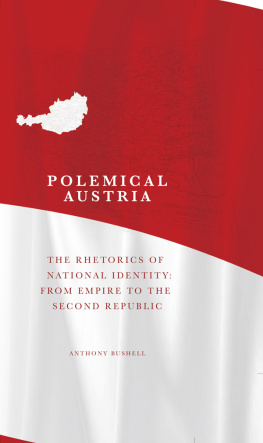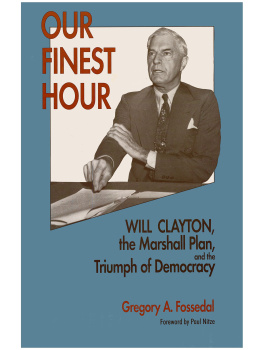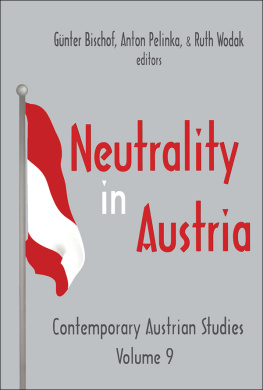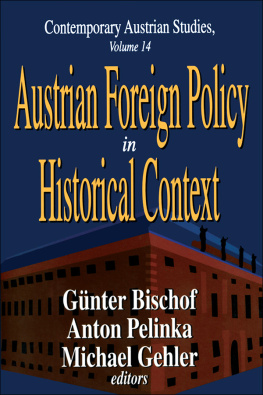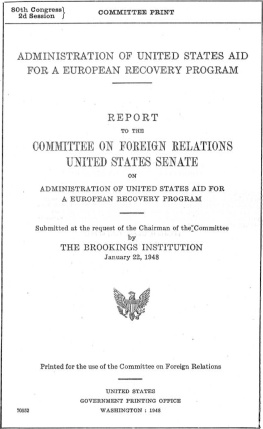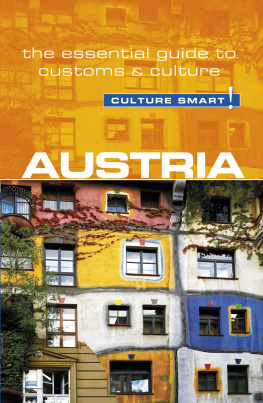
The Marshall Plan in Austria
Contemporary Austrian Studies
Sponsored by the University of New Orleans and Universitt Innsbruck
Editors
Gnter Bischof, CenterAustria, University of New Orleans
Anton Pelinka, University of Innsbruck
Production Editor
Ellen Palli
Copy Editor
Jennifer Shimek
Editoral Assistants
Gnther Walder
Daniela Kundmann
Executive Editors
Franz Mathis, University of Innsbruck
Gordon H. Mueller, Director, CenterAustria, University of New Orleans
Advisory Board
Ernst Hanisch
University of Salzburg
Michael G. Huelshoff
University of New Orleans
Wilhelm Kohler
University of Linz
Jacques LeRider
University of Paris VIII
Radomir Lua
Tulane University (Emeritus)
Andrei S. Markovits
University of Michigan, Ann Arbor
Sybil Milton
Washington D.C.
Margareta Mommsen
University of Munich
Hanspeter Neuhold
University of Vienna
Helga Nowotny
Swiss Institute of Technology, Zrich
Gemot Prisching
University of Graz
Peter Pulzer
Oxford University
Oliver Rathkolb
University of Vienna
Sieglinde Rosenberger
University of Vienna
Richard Rudolph
Center for Austrian Studies, University of Minnesota
Dieter Stiefel
University of Vienna
Franz Szabo
Center for Austrian Studies, University of Alberta
Ruth Wodak
University of Vienna
Publication of this volume has been made possible through generous grants from the ERP-Fonds of Vienna, the Austrian Culture Institute in New York, and the Bank Gutmann Nfg. AG in Vienna. The University of Innsbruck and Metropolitan College of the University of New Orleans have also provided financial support.
Articles appearing in this volume are abstracted and indexed in HISTORICAL ABSTRACTS and AMERICA, HISTORY and LIFE.
The Marshall Plan in Austria
Editors
Gnter Bischof
Anton Pelinka
Dieter Stiefel
Volume 8
Contemporary Austrian Studies
First published 2000 by Transaction Publishers
Published 2017 by Routledge
2 Park Square, Milton Park, Abingdon, Oxon OX14 4RN
52 Vanderbilt Avenue, New York, NY 10017
Routledge is an imprint of the Taylor & Francis Group, an informa business
Copyright 2000 by Taylor & Francis.
All rights reserved. No part of this book may be reprinted or reproduced or utilised in any form or by any electronic, mechanical, or other means, now known or hereafter invented, including photocopying and recording, or in any information storage or retrieval system, without permission in writing from the publishers.
Notice:
Product or corporate names may be trademarks or registered trademarks, and are used only for identification and explanation without intent to infringe.
Library of Congress Catalog Number: 99-087781
Library of Congress Cataloging-in-Publication Data
The Marshall Plan in Austria / Gnter Bischof, Anton Pelinka, Dieter Stiefel, editors.
p. cm.(Contemporary Austrian studies ; v. 8)
Includes bibliographical references.
ISBN 0-7658-0679-7 (paper : alk. paper)
1. Marshall Plan. 2. Economic assistance, AmericanAustria. 3. Reconstruction (1939-1951)Austria. 4. AustriaEconomic conditions1945- I. Bischof, Gnter, 1953- II. Pelinka, Anton, 1941-III. Stiefel, Dieter. IV. Series.
HC265 .M263 2000
338. 91 73043609044dc21 | 99-087781
CIP |
ISBN 13: 978-0-7658-0679-6 (pbk)
Dedicated to the Memory of
Joseph Logsdon
March 12, 1938 June 2, 1999
Table of Contents
Ferdinand Lacina,
Hans Fuenegger / Kurt Lffler,
Ingrid Fraberger / Dieter Stiefel,
Andrea Komlosy,
Jill Lewis,
Matthew Paul Berg,
Siegfried Beer,
Hans-Jrgen Schrder,
Hans Seidel,
Kurt Tweraser,
Georg Rigele,
Gnter Bischof,
Wilhelm Kohler,
Alexander N. Lassner,
Martin Kofler,
Markus M. L. Crepaz / Hans-Georg Betz,
Stephen Beller,
Lonnie Johnson,
Volker R. Berghahn,
Peter Thaler,
Kurt Tweraser,
Petra Goedde,
Reinhold Grtner,
Gnter Bischof
The American elite journal Foreign Affairs termed the Marshall Plan perhaps the most important foreign policy success of the postwar period.1 In both the American and Western European publics, where the memory of the Marshall Plan has been carefully cultivated over the past half a century, such extravagant praise for the European Recovery Program does not appear to be overstated. In Austria the historical memory of the significance of the Marshall Plan for the countrys postwar economic reconstruction as a basis for broad prosperity seems largely ignored by the political class and forgotten among the younger generation. Only the contemporaries of the postwar occupation, who lived through the difficult times of postwar want and destitution, seem to remember that the trajectory of Austrian postwar prosperity could hardly have been imaginable without the largesse of the European Recovery Program. It is clear that without Marshall Plan aid Austria would have needed much longer to recover from physical destruction and mental dejection after World War II. This seems strange for a nation that received almost one billion dollars in Marshall aid (1,5 billion if all the American aid programs from 1945 to 1952 are added up). With 132 dollars, Austria was among the top per capita recipients of Marshall Plan aid and arguably profited more than any other country participating in the ERP.2
Why this oblivion? Did the wartime generation want to pretend their extraordinary effort in reconstructing had come without any outside aid injection? Did the post-occupation political elite in the grand coalition governments, which led neutral Austria onto its extraordinary trajectory of peace and prosperity, not want to acknowledge how heavily Austria was indebted to this extraordinary American generosity during the occupation decade a time, it should be noted, when the Soviet Union extracted at least as much in reparations from its Eastern Austrian zone of occupation as the United States poured into the three Western zones with its various postwar aid programs? Does a well-educated, self-centered and often affluent younger generation, with its short historical memory and its neutralist island-of-the blessed mentality, no longer care to know about the genesis of their current prosperity and the American contribution to it during extraordinary years of Cold War tensions in Austrias vital geostrategic location? Why have Austrian governments failed to commemorate the recent 50th anniversary of General Marshalls speech at Harvard University3, which initiated the Marshall Plan, in official ceremonies as did most of the other ERP beneficiaries?4 Might it be a Cold War legacy in Austria that showing gratitude to the U.S. is an attitude unbecoming to a neutral country? Why is official Austria obsessed with cultivating the memory of the Anschluss in 1938, when the Alpine Republic was a victim of the international system, yet fails to remember the Marshall Plan, when the country happened to be a beneficiary? Why has Austrian contemporary and economic history scholarship been so laggard for so long to produce serious in-depth studies of the Marshall Plans macro- and microeconomic importance for Austrias postwar reconstruction, when Marshall Plan scholarship in Western Europe and American academia has been a vibrant area of Cold War research? Questions abound crying out to be answered.



